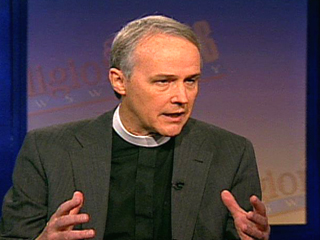In This Episode << SLIDE LEFT TO SEE ADDITIONAL SEGMENTS
World Hunger and U.S. Aid
KIM LAWTON, guest anchor: As President-elect Barack Obama put his economic team together this week, there were more signs of the magnitude of the financial crisis across the globe. According to a new report from the Christian anti-hunger group Bread for the World Institute, the number of people who are living in extreme poverty has increased by 100 million in less than two years, and the number of hungry people has increased by more than 75 million. The report said the world is facing a hunger challenge unlike anything seen in the past 50 years, and it called on Congress and the new administration to revamp U.S. foreign assistance in order to more effectively reduce global poverty and hunger.
Joining me now is Reverend David Beckmann, president of the Bread for the World. David, it seems like we hear all the time reports about hunger and how it’s on the rise. What makes this year different?
Reverend DAVID BECKMANN (President, Bread for the World Institute): Well, actually the world’s been making progress against hunger. Over the last several decades, the proportion of the world’s people who are undernourished has been coming down steadily. But the economy that’s been hurting a lot of us is also doing a lot of damage among poor people around the world. So, over the last several years, we’ve seen an increase in world hunger of 75 million people. So the widow in Mauritania who used to eat two meals of sorghum a day, she’s now eating one meal of sorghum soup.
LAWTON: And even in the U.S., we’re hearing reports that hunger is on the rise here as well?
Rev. BECKMANN: Absolutely. The economy is really tough on poor and hungry people. In on own country, you can go to the nearest food pantry — they’ll tell you. The government’s just coming out with data on hunger in 2007, so we know that last year the number of hungry children increased by 50 percent, and that’s before the economy got really bad.
LAWTON: You all make the case for more foreign assistance or better foreign aid. Is that a hard sell in a time when people are really concerned about the situation here? You know, is it hard to say we need to help people overseas when they’re worried about, you know, domestic hunger?
Rev. BECKMANN: I’m encouraged. We did a poll of voters on Election Day and 70 percent of American voters said they would like our government to spend more money to deal with the global hunger crisis. I think people know it’s the right thing to do. Certainly when we celebrate Thanksgiving we’re reminded of that. I think we also know it’s not smart to neglect misery in far-off places, and we’ve seen how the whole global economy is interconnected. So it’s good for our economy to pay attention to the global dimensions of development. Bread for the World’s members are churches across the country — are campaigning to make foreign assistance more effective. We think in a time like this we’ve got to make sure that our foreign aid is just as effective as it can be, and that more of the aid is getting to people who are struggling to overcome hunger and poverty.
LAWTON: Are you optimistic that the new Barack Obama administration will be receptive to some of your suggestions?
Rev. BECKMANN: Yeah. President-elect Obama really has made important promises to hungry and poor people in this country and around the world. I think the new — his idea of a jobs program is important. On the other hand, he’s pushed in all kinds of directions — certainly Congress will be. So those of us who care about the hunger and poverty dimension of this economic crisis need to talk to our members of Congress and tell them as they deal with the crisis, we also want them to deal with hunger and poverty in our country and all around the world.
LAWTON: All right. David Beckmann, thank you very much.
Rev. BECKMANN: Thank you.


